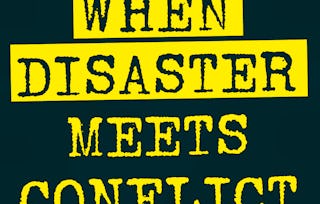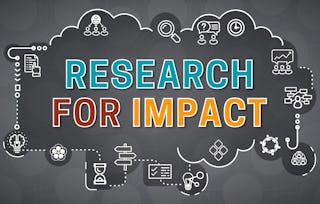Beweise sind von zentraler Bedeutung für eine gute Entscheidungsfindung sowohl im humanitären Sektor als auch darüber hinaus. Jeden Tag wird eine riesige Menge an Erkenntnissen gewonnen, die für die Akteure der humanitären Hilfe von Bedeutung sind, viele davon durch Forschung von Wissenschaftlern und Praktikern. Diese Erkenntnisse können unglaublich wertvoll sein. Sie können uns helfen, eine Situation besser zu verstehen und humanitäre Maßnahmen effektiver und verantwortungsbewusster zu gestalten. Die Schwierigkeit besteht darin, zu verstehen, welche Erkenntnisse für unsere Situation relevant sind, wo wir sie finden und wie wir ihre Qualität beurteilen können. Dieser Kurs vermittelt Ihnen die grundlegenden Kenntnisse und Fähigkeiten, um diese Fragen zu beantworten und Ihnen zu helfen, besser mit der Forschung umzugehen. Er wurde mit Blick auf Sie - eine Fachkraft für humanitäre Hilfe oder einen Nachwuchsforscher - entwickelt. Der Kurs führt Sie Schritt für Schritt durch die wichtigsten Forschungskonzepte und setzt keine Vorkenntnisse oder Erfahrungen voraus. Wir ermutigen Sie dazu, Ihre eigene Lernreise zu planen und diesen MOOC so zu nutzen, wie es für Sie am nützlichsten ist.

Operative Forschung für humanitäre Helfer

Operative Forschung für humanitäre Helfer



Dozenten: Karl Blanchet
11.729 bereits angemeldet
Bei enthalten
151 Bewertungen
Empfohlene Erfahrung
Kompetenzen, die Sie erwerben
- Kategorie: Politische Analyse, Forschung und Entwicklung
- Kategorie: Erhebung von Daten
- Kategorie: Entscheidungsfindung
- Kategorie: Umfragen
- Kategorie: Fallstudien
- Kategorie: Verantwortlichkeit
- Kategorie: Nachforschungen
- Kategorie: Qualitative Forschung
- Kategorie: Forschung
- Kategorie: Bedarfsanalyse
- Kategorie: Methoden der Forschung
- Kategorie: Community Outreach
- Kategorie: Anpassungsfähigkeit
- Kategorie: Ethische Standards und Verhaltensweisen
- Der Fähigkeiten-Abschnitt ist eingeklappt. 10 von 14 Fähigkeiten werden angezeigt.
Wichtige Details

Zu Ihrem LinkedIn-Profil hinzufügen
32 Aufgaben
Erfahren Sie, wie Mitarbeiter führender Unternehmen gefragte Kompetenzen erwerben.

In diesem Kurs gibt es 5 Module
In diesem ersten Modul tauchen wir direkt in die Frage ein, warum es einen Bedarf an Forschung in humanitären Einrichtungen gibt. Wir werden die schwierigen Entscheidungsfindungsprozesse in der humanitären Hilfe untersuchen und feststellen, dass eine gute Entscheidung von vier verschiedenen Arten von Informationen abhängt. Ausgangspunkt wird das Konzept der Evidenz sein und wie es mit menschlichen Vorurteilen und professionellem Urteilsvermögen zusammenhängt. Indem wir von globalen Experten, Praktikern und Ihren Kommilitonen hören, werden wir uns kritisch mit dem Wert der Forschung auseinandersetzen und fragen: Warum, wann und für wen?
Das ist alles enthalten
10 Videos9 Lektüren5 Aufgaben1 App-Element1 Diskussionsthema1 Plug-in
In diesem zweiten Modul erwerben wir ein grundlegendes Verständnis und Fähigkeiten rund um die Forschung und ihre Prozesse, Methoden und Kernterminologie. Außerdem erkunden wir, wie wir die Schlüsselfrage "Welche Belege sind gut genug?" beantworten können. Auf diese Weise werden wir in die Lage versetzt, gängige Studiendesigns zu untersuchen und ihre jeweiligen Stärken und Schwächen zu erkennen. Auf dieser Grundlage werden wir dann - im nächsten Modul - untersuchen, wie das Konzept der Qualität bei der Durchführung von Forschungsarbeiten in humanitären Einrichtungen etwas unschärfer wird
Das ist alles enthalten
10 Videos5 Lektüren5 Aufgaben3 App-Elemente1 Diskussionsthema
In diesem Modul werden Sie ein solides Verständnis dafür erlangen, wie sich die wichtigsten Merkmale humanitärer Situationen darauf auswirken, wie wir die Studiendesigns, die wir in Modul zwei behandelt haben, anwenden können (oder nicht). Wir werden untersuchen, wie wir unsere Studiendesigns und -instrumente anpassen und kombinieren müssen, um diese gemeinsamen Herausforderungen zu überwinden. Am Ende dieses Moduls werden Sie mit einem etwas anderen Forschungsinstrumentarium ausgestattet sein, das für den Einsatz in humanitären Einrichtungen besser geeignet ist. Während der gesamten Dauer dieses Moduls werden wir uns stark von praktischen Beispielen und bestehenden Projekten leiten lassen.
Das ist alles enthalten
12 Videos9 Lektüren9 Aufgaben
Das vierte Modul befasst sich mit einem der kritischsten Aspekte der guten Forschungspraxis: Ethik. Nachdem wir uns zuvor mit den potenziellen Vorteilen der Forschung im humanitären Bereich beschäftigt haben, werden wir uns hier auf die potenziellen Risiken und ethischen Dilemmas bei der Durchführung von Forschungsarbeiten konzentrieren. Wir beginnen mit einem Rückblick auf einige berüchtigte historische Beispiele für unethische Forschung, wie die Tuskegee-Studie. Anschließend werden wir gemeinsam bewährte Praktiken erarbeiten, wie wir ethische Überlegungen und Risikominderung systematisch und aufrichtig in unsere Forschungsprojekte integrieren können. In diesem Zusammenhang werden wir uns speziell mit dem Engagement der Gemeinschaft als einem der vielen mächtigen Instrumente befassen, die uns zur Verfügung stehen. Dieses Modul wird Ihnen auch helfen, viele der zentralen forschungsethischen Prozesse zu verstehen, wie z.B. die informierte Zustimmung und ethische Prüfgremien.
Das ist alles enthalten
8 Videos7 Lektüren6 Aufgaben2 App-Elemente2 Diskussionsthemen
In diesem abschließenden Modul werden wir all unsere Einsichten und Erkenntnisse miteinander verbinden, indem wir auf unsere ursprünglichen Fragen zum Wert der Forschung in humanitären Situationen zurückkommen. Diesmal werden wir uns auf das "Wie" konzentrieren, indem wir uns ansehen, wie wir sicherstellen können, dass unsere Forschung wertvoll ist und wie wir die von uns gewonnenen Erkenntnisse in umsetzbare Empfehlungen übersetzen können. Wir werden uns mit den üblichen Fallstricken bei der Weitergabe von Erkenntnissen befassen und Ansätze und Instrumente kennenlernen, die sich im Laufe der Zeit als nützlich erwiesen haben. Wir werden nicht nur einen schrittweisen Prozess erlernen, sondern auch die Bedeutung kontextbezogener Ansätze schätzen lernen, die die bestehende Machtdynamik in Betracht ziehen.
Das ist alles enthalten
11 Videos7 Lektüren7 Aufgaben2 App-Elemente
Dozenten


Mehr von Forschung entdecken
 Status: Kostenlos
Status: KostenlosErasmus University Rotterdam
 Status: Vorschau
Status: VorschauUniversity of Cape Town
 Status: Kostenlos
Status: KostenlosJohns Hopkins University
 Status: Vorschau
Status: VorschauEmory University
Warum entscheiden sich Menschen für Coursera für ihre Karriere?

Felipe M.

Jennifer J.

Larry W.

Chaitanya A.
Bewertungen von Lernenden
- 5 stars
82,11 %
- 4 stars
15,89 %
- 3 stars
0,66 %
- 2 stars
0,66 %
- 1 star
0,66 %
Zeigt 3 von 151 an
Geprüft am 24. März 2023
An amazing course. Detailed and insightful yet practical.
Geprüft am 15. Mai 2025
Very knowledgable, practical and interactive research course for feeding the mind with more interests and inquiry into research and it's application.
Geprüft am 11. Dez. 2024
very informative, lots of resources and engaging quiz questions

Neue Karrieremöglichkeiten mit Coursera Plus
Unbegrenzter Zugang zu 10,000+ Weltklasse-Kursen, praktischen Projekten und berufsqualifizierenden Zertifikatsprogrammen - alles in Ihrem Abonnement enthalten
Bringen Sie Ihre Karriere mit einem Online-Abschluss voran.
Erwerben Sie einen Abschluss von erstklassigen Universitäten – 100 % online
Schließen Sie sich mehr als 3.400 Unternehmen in aller Welt an, die sich für Coursera for Business entschieden haben.
Schulen Sie Ihre Mitarbeiter*innen, um sich in der digitalen Wirtschaft zu behaupten.
Häufig gestellte Fragen
Um Zugang zu den Kursmaterialien und Aufgaben zu erhalten und um ein Zertifikat zu erwerben, müssen Sie die Zertifikatserfahrung erwerben, wenn Sie sich für einen Kurs anmelden. Sie können stattdessen eine kostenlose Testversion ausprobieren oder finanzielle Unterstützung beantragen. Der Kurs kann stattdessen die Option "Vollständiger Kurs, kein Zertifikat" anbieten. Mit dieser Option können Sie alle Kursmaterialien einsehen, die erforderlichen Bewertungen abgeben und eine Abschlussnote erhalten. Dies bedeutet auch, dass Sie kein Zertifikat erwerben können.
Wenn Sie ein Zertifikat erwerben, erhalten Sie Zugang zu allen Kursmaterialien, einschließlich der benoteten Aufgaben. Nach Abschluss des Kurses wird Ihr elektronisches Zertifikat zu Ihrer Erfolgsseite hinzugefügt - von dort aus können Sie Ihr Zertifikat ausdrucken oder zu Ihrem LinkedIn-Profil hinzufügen.
Ja. Für ausgewählte Lernprogramme können Sie eine finanzielle Unterstützung oder ein Stipendium beantragen, wenn Sie die Anmeldungsgebühr nicht aufbringen können. Wenn für das von Ihnen gewählte Lernprogramm eine finanzielle Unterstützung oder ein Stipendium verfügbar ist, finden Sie auf der Beschreibungsseite einen Link zum Antragsformular.
Weitere Fragen
Finanzielle Unterstützung verfügbar,





